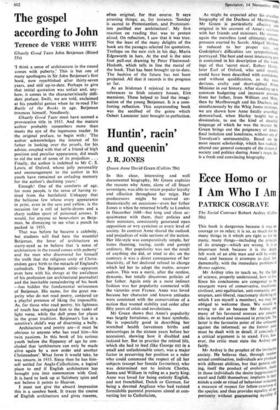Huntin', racin' and queenin'
J. R. JONES
Queen Anne David Green (Collins 70s) In this clear, interesting and well documented biography, Mr Green explains the reasons why Anne, alone of all Stuart sovereigns, was able to retain popular loyalty and affection throughout her reign. Her predecessors might be received en- thusiastically on occasions—even her father James ti when he returned briefly to London in December 1688—but long and close ac- quaintance with them, their policies and their ministers, consistently generated open opposition or wry cynicism at every level of society. In contrast Anne shared the outlook and prejudices of wide sections of the nation. Her life-style was comparatively simple, her tastes (hunting, racing, cards and gossip) ordinary. Her popularity was not the result of anything she did, or tried to do; on the contrary it was a direct consequence of her inactivity, of her declared refusal to change which led her to adopt the motto, semper eadent. This was a merit, after the restless, dynamic, but totally disastrous policies of her father. Again only in a most indirect fashion was her popularity connected with the victories over France. Anne was loved because her character and known attitudes were consistent with the conservatism of a nation that wanted stability and order after fifty years of crisis and revolutions.
Mr Green shows that Anne's popularity was largely fortuitous, or at least symbolic. He is especially good in describing her wretched health (seventeen births and miscarriages in the sixteen years before her accession), showing how it disabled and isolated her. But in practice the retired life, which she had to lead (like George m) in a small and unfashionable court, was a major factor in preserving her position as a ruler who could command the respect of all her subjects (except her female favourites), who was determined not to imitate Charles, James and William in ruling as a party king. Anne was loved for being entirely English, and not frenchified, Dutch or German, for being a devoted Anglican who had resisted formidable parental pressures aimed at con- verting her to Catholicism,
As might be expected after his excellent biography of the Duchess of Marlborough, Mr Green is particularly effective and original in his account of Anne's relations with her friends and ministers. He recounts again the merciless (and ultimately obtuse) pressure exerted by Sarah; Abigail Masham is reduced to her proper size, and Godolphin's difficulties are sympathetically portrayed. The best and most interesting pan is contained in his description of the work. ings of that 'secret man', Robert Harlev, later Earl of Oxford, who until recently could have been described with confidence, and without qualification, as the most devious, crafty and short-sighted Prime Minister in our history. After standing 111) to constant badgering and incessant pressure from her father, from William and Mary, then by Marlborough and his Duchess, and simultaneously by the Whig Junto ministers, we are shown how Anne finally crumbled, demoralised, when Harley taught her to dissimulate, to use the kind of deceitful language of which he was the master. Mr Green brings out the poignancy of Anne's final isolation and loneliness, without any of Trevelyan's sentimentality. Based on the most recent scholarship, which has radically altered our general concepts of the nature of society and politics during Anne's reign, this is a fresh and convincing biography.








































 Previous page
Previous page